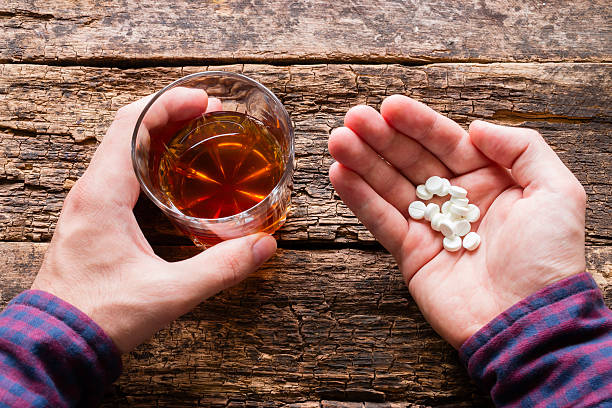Drug and alcohol addiction is a persistent, relapsing disorder marked by obsessive, uncontrollable substance use, notwithstanding the detrimental effects on one’s life. It is a complicated illness that alters the reward system in the brain, causing intense cravings, erratic behavior, and dangerous drug-abuse-related behaviors.

Benefits of treatment for drug and alcohol addiction
The benefits of seeking substance abuse treatment are numerous and can positively impact various aspects of a person’s life. Here are some key benefits:
Enhanced Physical Health: Substance misuse affects physical health, which can cause several medical issues. Treatment for addiction assists people in addressing their substance use, which improves physical fitness, lowers the danger of overdose, and reduces the possibility of long-term health issues linked to substance misuse.
Enhanced Mental and Emotional Well-being: Addiction frequently co-occurs with mental health issues such as anxiety, depression, or trauma-related conditions. The substance abuse treatment allows patients to address their addiction and underlying mental health conditions through therapy, counseling, and, if required, medication. This comprehensive strategy can enhance emotional stability, mental health, and general quality of life.
Restored Relationships: Abusing drugs or alcohol can strain connections with friends, family, and coworkers. The opportunity to reestablish connections, mend broken trust, and create better communication and coping mechanisms are provided by addiction treatment services. In addition, loved ones can participate in rehabilitation through family therapy and support groups, promoting understanding and fortifying ties.
Increased Personal Development and Self-Esteem: Addiction frequently undermines a person’s sense of accomplishment and self-worth. Through treatment for addiction, people acquire the knowledge and abilities to beat addiction, create better coping strategies, and make wiser life decisions. Through this process, people can grow personally, improve their self-worth, and gain the ability to live a fruitful and meaningful life in recovery.
Improved Career and Financial Stability: Substance misuse can negatively affect one’s capacity to find work and maintain financial security. Through addiction treatment services, people can regain concentration, learn practical skills, and raise their prospects of landing fulfilling employment. Recovery benefits include regaining financial control, making appropriate decisions, and lessening the financial burden associated with addiction.
Supportive Community and Lifelong Recovery: Addiction therapy makes access to an understanding of peer and professional community possible. Support groups, such as 12-step organizations like Alcoholics Anonymous (AA) or Narcotics Anonymous (NA), provide ongoing assistance, hold members accountable, and urge them to keep their recovery. This sense of belonging to a group can be a vital source of support as you go through your rehabilitation.
Reduced Legal Problems and Relapse Risk: Substance addiction frequently results in legal issues and involvement in risky behaviors. The legal repercussions of one’s behavior can be addressed, relapse risk can be decreased, and a stable and law-abiding lifestyle can be established with substance abuse treatment.
Ways To Prevent Drug & Alcohol Addiction
Prevention is essential to address these problems before they develop into full-blown addictions. We can lessen the risk factors connected with drug and alcohol abuse and encourage healthier lifestyles by implementing efficient preventive measures.
Education and Awareness:
Education is one of the most effective methods for preventing addiction. Therefore, it is essential to conduct thorough drug and alcohol education programs in companies, communities, and schools. These initiatives should emphasize educating the public about the dangers and effects of substance usage, busting myths, and dispelling misconceptions about addiction and recovery. Educating people enables them to take control of their decisions and fend off the pressure to use drugs and alcohol.
Early Intervention:
To stop addiction, early intervention is essential. Early detection and treatment of risk factors can dramatically lower the likelihood of substance dependence. It’s also critical to identify vulnerable indicators, such as trauma, mental health conditions, or a family history of addiction, and to offer the proper support and therapy. By addressing these underlying causes, we can assist people in strengthening their resilience and creating better-coping strategies.
Positive Peer Influence:
Peers have a significant impact on a person’s decisions and actions. Therefore, promoting healthy peer connections and social surroundings is essential to prevent addiction effectively. We establish a feeling of community and lessen the attraction of substance addiction by encouraging addiction treatment services, supportive friendships, offering fit role models, and planning drug-free social activities.
Strong Family Bonds:
Family is crucial in the fight against addiction. Families with open lines of communication, trust, and emotional support provide a haven for people, especially kids, and teenagers. By encouraging good family relationships and spending quality time together, we build a foundation of love and stability that lowers the likelihood of someone turning to drugs or alcohol for consolation.
Access to Mental Health Services:
Substance misuse and mental health issues are frequently related. People can address underlying concerns that may result in self-medication with drugs or alcohol by receiving accessible and affordable drug rehab centers. Additionally, routine exams, counseling, and therapy sessions help spot and handle mental health issues before they worsen and cause addiction.
Community Involvement:
Communities are essential in the fight against addiction. We build a network of support and accountability by actively involving community members in preventative activities. Additionally, community outreach initiatives, extracurricular activities, and drug-free gatherings can provide people, particularly young people, with other paths to personal development and fulfillment.
Strong Policies and Regulations:
Drug and alcohol addiction can be significantly reduced with the help of effective laws and policies. To limit easy access to drugs and alcohol, stricter regulations on selling and marketing narcotics, enforcing age restrictions, and adopting responsible prescribing practices are crucial. Additionally, funding treatment at drug rehab centers guarantees that persons battling addiction receive the assistance they need to overcome obstacles.
Conclusion
It takes guts to seek drug and alcohol addiction treatment on the path to a happier, healthier life. However, it enables people to overcome addiction, regain their physical and mental health, mend their relationships, and grow personally. People can overcome addiction and embrace a life of recovery and well-being with thorough and tailored addiction treatment services.